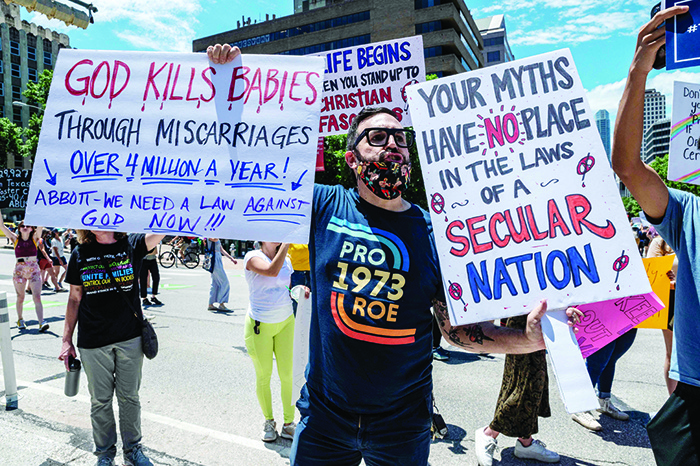 AUSTIN, Texas: File photo shows protesters march down Congress Ave at a protest outside the Texas state capitol on May 29, 2021 in Austin, Texas. A Texas law that bans abortion after six weeks, and makes no exception for rape or incest, took effect yesterday. —AFP
AUSTIN, Texas: File photo shows protesters march down Congress Ave at a protest outside the Texas state capitol on May 29, 2021 in Austin, Texas. A Texas law that bans abortion after six weeks, and makes no exception for rape or incest, took effect yesterday. —AFP
WASHINGTON: A Texas law that bans abortion after six weeks, and makes no exception for rape or incest, took effect yesterday after the Supreme Court did not act on an emergency request to block it. Governor Greg Abbott, a Republican, signed a bill in May to ban abortion once a fetal heartbeat can be detected, usually in the sixth week of pregnancy.
While similar bans have been passed in a dozen states, all had so far been blocked in the courts from going into force. The Supreme Court may still grant the request from rights groups and abortion providers to halt the so-called “heartbeat bill”, which makes Texas the hardest state in the United States in which to get an abortion.
The American Civil Liberties Union, Planned Parenthood, the Center for Reproductive Rights and other groups filed an emergency request with the Supreme Court on Monday asking it to stop the law from taking effect. “Approximately 85 to 90 percent of people who obtain an abortion in Texas are at least six weeks into pregnancy, meaning this law would prohibit nearly all abortions in the state,” ACLU said.
The other states that have sought to enact restrictions on abortion in the early stages of pregnancy have been barred from doing so by the landmark 1973 Supreme Court ruling Roe v Wade. That decision allowed abortion so long as the fetus is not viable, which is usually the case until the 22nd to 24th weeks of pregnancy.
Texas’s law is different from those of other states because it allows the public-rather than state officials like prosecutors or health departments-to enforce the ban. Everyday citizens are encouraged to report people getting an abortion in violation of the terms of the law or doctors who perform them.
The Texas law “creates a bounty hunting scheme that encourages the general public to bring costly and harassing lawsuits against anyone who they believe has violated the ban,” the ACLU said. “Anyone who successfully sues a health center worker, an abortion provider, or any person who helps someone access an abortion after six weeks will be rewarded with at least $10,000, to be paid by the person sued,” it said.
“Anti-abortion groups in Texas have already set up online forms enlisting people to sue anyone they believe is violating the law and encouraging people to submit ‘anonymous tips’ on doctors, clinics, and others who violate the law,” it said.
Nancy Northup, president of the Center for Reproductive Rights, said the Texas bill would force women to “travel out of state-in the middle of a pandemic-to receive constitutionally guaranteed healthcare.”
“Many will not be able to afford to,” Northup said. “It’s cruel, unconscionable, and unlawful.” Alexis McGill Johnson, president of Planned Parenthood, said the Supreme Court is being asked “to uphold 50 years of precedent and ensure Texans won’t be denied their constitutional right to abortion.”
The Supreme Court is due to hear a case this fall involving a Mississippi law that prohibits abortions after the 15th week of pregnancy except in cases of medical emergency or a severe fetal abnormality. It will be the first abortion case considered by the nation’s high court since former president Donald Trump cemented a conservative majority on the nine-member panel. — AFP

